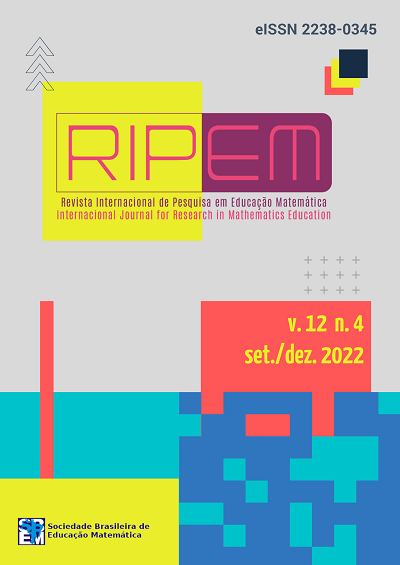Potentialities of the dialogue between the Mancala Awelé game and the teaching of Mathematics in Elementary Education: experience with a class of the 5th year
DOI:
https://doi.org/10.37001/ripem.v12i4.3131Keywords:
Mancala Game, Mathematics Teaching, Ethnomatematic, Antonio Duarte de Almeida SchoolAbstract
This article aims to use the game of African origin called Mancala Awelé, aiming at the dialogue with mathematical knowledge in a 5th grade class at the Municipal School of Elementary Education (EMEF) Antônio Duarte de Almeida/SP, for the promotion of interdisciplinary learning, based on the otherness and respect for differences. In addition, it is intended to mobilize mathematical skills necessary for the training of male and female students. For this, we use the qualitative paradigm. One of the authors, as a professor at the institution, was part of the environment of the studied students, observing the interaction, development and strategies through the way they made decisions and the look they deposited in the game, changing the points of view regarding the culture. During the interaction, it was possible to contemplate the main mathematical skills of each student participating in the game.
Downloads
References
Cassela, E., & Nascimento, R. de (2020). Estudo da circunferência à luz dos princÃpios axiomáticos de René Descartes. um olhar ao contexto de ensino-aprendizagem da Escola Superior Pedagógica do Bié (esp-bié). Revista Eletrônica de Educação Matemática, 15(2), 1-21.
D’Ambrosio, U. (2009). Etnomatemática e história da Matemática. In: M. C. B. Fantinato. (Org). Etnomatemática: novos desafÃos teóricos e pedagógicos. (pp. 17-28). Niterói, RJ: Editora da UFF.
Erickson, F. (1977). Some approaches to inquiry in school-community ethnography. Anthropology & Education Quarterly, 8(2), 58-69.
Silveira, D. T. & Fernanda, P. C. (2009). A pesquisa cientÃfica. In: T. E. Gerhardt & D. T. Silveira. (Org). Métodos de pesquisa. (pp. 31-42). Porto Alegre, RS: Editora UFRGS.
Huizinga, J. H. L. (1971). O jogo como elemento da cultura. São Paulo, SP: Perspectiva.
Moreira, M. A. (2003). Pesquisa em ensino: aspetos metodológicos. Burgos, BG: Editora da Universidade de Burgos.
Muniz, C. A. (2010). Brincar e jogar: enlaces teóricos e metodológicos no campo da educação matemática. Belo Horizonte, MG: Autêntica.
Murray, H. J. R. (1952). A history of board-games other than chess. The Journal of Hellenic Studies, 74(2), 200-219.
Novais, E. S. (2008). Jogos e brincadeiras de origem africana e afro-brasileira que podem ser trabalhadas na sala de aula de Educação FÃsica. 83f. Trabalho de Conclusão de Curso (Especialização em História e Cultura Africana e Afro-braslleira, Educação e Ações Afirmativas no Brasil, no Curso de História). Universidade Tuiuti do Paraná. Curitiba.
Prista, A., Tembe, M. & Edmundo, H. (1992). Jogos de Moçambique. Beira, MTO: Editora do Instituto Nacional de Educação Fisica.
Santos, E., & França, M. C. (2017). Simbiose entre Etnomatemática e a cultura Africana: Jogo Mancala Awelé em sala de aula. Com a Palavra, o Professor, 1(1), 88-99.
BRASIL. Ministério da Educação. Secretaria de Educação Fundamental (1997). Parâmetros Curriculares Nacionais: Ensino Fundamental – Matemática. BrasÃlia: MEC/SEF.
SÃO PAULO (MunicÃpio). Secretaria Municipal de Educação de São Paulo. Diretoria de Orientação Técnica (2003). Diretrizes Curriculares Nacionais para a Educação das Relações Étnico-Raciais e para o Ensino de História e Cultura Afro-Brasileira e africana. São Paulo, SP: SME/DOT.
EMEF Antônio Duarte de Almeida (2018). Projeto PolÃtico Pedagógico. DisponÃvel em https://drive.google.com/file/d/18aBw7SWbfN8NLhm4LcQWTdJQlw-ZCfaR/view
Vital, J. E., & De Mendonça, P. C. (2018). Jogos na sala de aula: como eles podem ajudar a desenvolver habilidades e conhecimentos matemáticos. Associe-se à Abt, 3(8), 86-95.
Published
How to Cite
Issue
Section

This work is licensed under a Creative Commons Attribution-NonCommercial-ShareAlike 4.0 International License.








